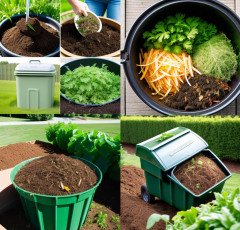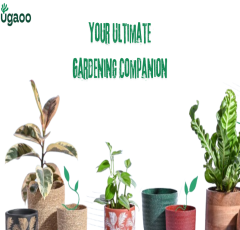
Organic Pest Control: Protecting Your Garden Naturally

A garden teeming with colourful blooms, lush foliage, and thriving greens all without a single harmful pesticide in sight. It's now not a gardening fairy story, it's the world of natural pest control, where nature's answers reign perfect. In a time when environmental attention and sustainable practices are paramount, the pursuit of pest free gardens takes a natural twist. Join us as we embark on a journey to find out the art and science of organic pest manipulate, where concord with the surroundings is the key to retaining your garden flourishing and thriving. Say goodbye to harmful chemicals and welcome a brand new era of gardening it truly is as inexperienced as it's far beautiful. Welcome to the arena of natural pest manage.
Introduction: Unleash the Magic of a Pest-Free Garden: The Organic Way
Imagine entering into your lawn, a lush and colourful oasis where each plant blooms with power, and every leaf dances within the breeze. The colorations are vivid, the fragrance intoxicating, and the taste of homegrown produce is unheard of. Now, consider all of this with out a single poisonous pesticide in sight. It's no longer a dream, it has the reality of a thriving, pesticide free lawn, and it's within your reach.
In this inexperienced haven, ladybugs, lacewings, and pollinators abound, appearing a symphony of nature's best work. Your tomatoes are plump, your roses are radiant, and your herbs are brimming with taste all thanks to the harmonious coexistence of flowers, beneficial bugs, and other herbal allies. Welcome to the arena of organic pest control, in which sustainability and environmental friendliness are on the heart of gardening.
In latest generation of heightened environmental cognizance, natural pest manipulate is not always only a desire, it is a duty we owe to our planet. It's a commitment to nurturing gardens that thrive with out compromising the sensitive stability of nature. But why is natural pest control so vital for the fitness of your lawn and the arena at massive? Let's discover the answers and embark on a adventure a good way to remodel your gardening practices forever.
What Are Garden Pests and Why Control Them?
Before we delve deeper into the world of natural pest control, it is vital to acquaint ourselves with the mischievous characters we are handling garden pests. These uninvited guests are just like the troublemakers at a lawn celebration, inflicting havoc and chaos wherein they move.
Garden pests are available in various paperwork, from tiny aphids to large insects like caterpillars and beetles. They may additionally consist of fungi, bacteria, and even mammals along with rodents. These pests have a voracious urge for food for the one you love flora and might wreak havoc in no time.
The effect of garden pests on vegetation can be devastating. They feast on leaves, stems, and roots, depriving plants of crucial vitamins and moisture. This relentless feeding weakens the vegetation, making them prone to diseases and environmental stressors. As a end result, your once thriving lawn can quick grow to be a battleground of struggling, stunted, or even demise vegetation.
Now, you might marvel why pest manage is so essential in the grand scheme of gardening. Here's the deal, effective pest control is not always just about keeping your plant life pretty, it's approximately ensuring their lengthy time period health and power.
So, as we undertaking in addition into the arena of organic pest manage, preserve in thoughts that the goal is not merely to do away with pests it is to create a garden that flourishes in harmony with nature, wherein pests are controlled responsibly, and plants thrive in their full glory. The adventure awaits.
The Dangers of Chemical Pesticides
In the quest for a pest loose lawn, it is clean to turn to chemical pesticides as a brief repair. After all, they promise instantaneous results, and the idea of banishing lawn intruders may be tempting. However, this reputedly convenient answer comes at a high fee a fee borne not simplest with the aid of the environment however also via useful bugs and human fitness.
Chemical pesticides, while effective at concentrated on pests, frequently go away at the back of a path of unintentional environmental consequences. When implemented excessively or without right care, they are able to: -
While chemical insecticides are designed to goal particular pests, they often damage useful insects that play a important role in pollination and pest control. Bees, mainly, are extraordinarily liable to pesticide publicity. When beneficial bugs decline, gardeners face a double edged sword- fewer pollinators and improved pest strain.
Growing cognizance of the capacity fitness risks associated with chemical pesticides has brought about issues amongst gardeners and purchasers alike. These risks can consist of: -
The Need for Organic Pest Control: A Safer, More Sustainable Approach
Given the environmental and fitness dangers associated with chemical pesticides, there is a growing need for opportunity, organic techniques of pest manipulate. Organic pest manage strategies prioritize the usage of natural predators, accomplice planting, organic sprays, and different environmentally friendly practices that sell the fitness and resilience of your garden while minimizing damage to the ecosystem.
By selecting organic pest manipulate, you no longer only guard beneficial bugs, human fitness, and the environment, but you furthermore may foster a lawn that flourishes in concord with nature. So, as we explore the arena of natural pest control in addition, preserve in mind the essential role it plays in safeguarding our planet's health and well-being.
Understanding Beneficial Insects
In the difficult tapestry of your lawn environment, there are unsung heroes running tirelessly to hold the balance. These heroes are none other than beneficial insects, the guardians of natural pest control. They are like nature's mystery sellers, stealthily patrolling your lawn, looking for troublemakers, and ensuring the protection of your vegetation.
Beneficial bugs play a vital function in keeping a wholesome lawn. They are the last pest manipulate squad, and their undertaking is simple: to dinner party at the lawn pests that threaten your flowers. Here's how they do it: -
Common Beneficial Insects and Their Prey
Now, let's introduce you to a number of the ordinary superheroes in your lawn, together with the villains they're after: -
By nurturing a garden environment that attracts and supports beneficial insects, you are essentially recruiting a natural military to guard your flowers. These lawn defenders aren't only efficient but also environmentally pleasant, making them vital allies on your quest for a thriving, pesticide free garden. So, the following time you see a ladybug or lacewing on your garden, deliver them a nod of gratitude they're operating tough to maintain your lawn pest free.
Companion Planting for Pest Control
Imagine if you may strategically plant your lawn in a manner that not best beautifies it however also deters pests obviously. Well, you may, Welcome to the world of accomplice planting, a smart gardening approach that pairs vegetation to beautify each other's boom and shield against undesirable invaders. It's like nature's model of getting a garden complete of vigilant bodyguards.
Companion planting is rooted in the concept that sure vegetation, while grown together, can both beautify every different's increase or help repel pests. It has a harmonious technique that mimics the manner flora certainly engage inside the wild. Here's how it works: -
Now, allow's discover some powerful accomplice plant combinations that function your garden's natural pest manage group: -
These are just a few examples of the infinite associate planting mixtures you may discover. The key's to take a look at your garden's specific needs, test, and discover which plant partnerships paintings fine in your precise surroundings. With accomplice planting, you are not handiest developing a visually appealing and numerous garden however additionally fostering a herbal protection gadget that maintains pests at bay. Your lawn's bodyguards are on duty, ready to guard and nurture your vegetation.
DIY Organic Pest Control Remedies
When it comes to retaining lawn pests in take a look at, you do now not need to depend on harsh chemical compounds. Mother Nature gives a treasure trove of organic remedies which can efficiently deter unwanted invaders. Armed with ingredients like neem oil, garlic, soap, and vinegar, you can whip up selfmade pest manipulate answers which might be as eco friendly as they may be powerful. Let's discover those natural recipes and learn how to follow them with finesse.
Ingredients
- 1 tablespoon neem oil
- 1-2 teaspoons moderate liquid cleaning soap
- 1 quart warm water
Directions
- Combine neem oil and liquid soap in a sprig bottle.
- Add warm water to the aggregate and shake well.
- Spray the solution on plants suffering from aphids, spider mites, whiteflies, and other gentle bodied pests.
Tips for Effective Use
- Apply neem oil spray in the early morning or overdue night to save you harm to beneficial bugs.
- Reapply after rain, as it could wash off the solution.
Ingredients
- 2-three cloves of garlic
- 1-2 hot chili peppers
- 1 quart water
- 1 teaspoon liquid soap
Directions
- Blend garlic and chili peppers with water in a blender.
- Strain the combination into a spray bottle and add liquid cleaning soap.
- Spray on plant life to deter aphids, caterpillars, and different not unusual pests.
Tips for Effective Use
- Wear gloves whilst coping with hot chili peppers.
- Test the spray on a small vicinity of your plant to ensure it does not reason any harm.
Ingredients
- 1-2 tablespoons moderate liquid cleaning soap
- 1 quart water
Directions
- Mix liquid soap with water in a twig bottle.
- Spray the answer on plants laid low with aphids, mealybugs, and other soft-bodied pests.
Tips for Effective Use
- Use a moderate, biodegradable soap to decrease harm to plant life.
- Spray in the morning or nighttime while pests are maximum lively.
Ingredients
- Equal elements of vinegar and water
Directions
- Mix vinegar and water in a twig bottle.
- Spray the solution immediately on ant trails and around plants to discourage ants.
Tips for Effective Use
- Avoid spraying vinegar without delay on flowers, as it may harm them.
Ingredients
- A shallow dish or field
- Beer
Directions
- Bury the dish inside the ground in order that the rim is level with the soil surface.
- Pour beer into the dish, leaving it approximately an inch deep.
- Slugs and snails will be interested in the beer, fall in, and drown.
Tips for Effective Use
- Empty and fill up the beer lure regularly to preserve its effectiveness.
By developing and making use of these home made natural pest manage answers, you may guard your lawn without compromising on your commitment to green practices. Experiment with those natural recipes, look at their effect to your lawn, and experience a pest free, thriving oasis where nature reigns best. Your garden and the planet will thank you for it .. :)
Attracting Wildlife for Pest Control
Imagine having a squad of committed pest controllers for your lawn feathered buddies, amphibious allies, and pollinating buddies all working in harmony to maintain undesirable invaders at bay. It's not a pipe dream, it is the magic of attracting flora and fauna to your lawn. By growing an inviting environment for birds, frogs, and other creatures, you could enjoy a herbal and sustainable way to manipulate pests. Let's dive into the art of garden friendly natural world and find out how to turn your green area right into a thriving atmosphere.
Birds are voracious customers of garden pests, from caterpillars to snails and insects. Attracting them for your garden is like hiring a squad of hungry detectives to seek out lawn intruders. Here's how to make your garden a chook friendly haven: -
Frogs and toads are nature's soil caretakers, munching on lawn pests like slugs and bugs. To invite those amphibious allies for your lawn: -
Pollinators like bees, butterflies, and hummingbirds are essential for the duplicate of many flora. By attracting them for your garden, you are no longer simplest assisting in pollination but also growing a thriving surroundings. Here's the way to invite those pollinating buddies: -
By incorporating those wildlife friendly factors into your garden, you may create a biodiverse haven where birds, frogs, and pollinators thrive. They will repay your hospitality by using supporting to control lawn pests clearly, making sure your inexperienced area remains each beautiful and ecologically sound. It's a win-win in your lawn and the surroundings.
Organic Pest Control Products
When the conflict against garden pests calls for reinforcements, you do now not need to hotel to chemical war. Enter the world of organic pest manage merchandise, where nature pleasant answers abound. These commercially available products are just like the superheroes of the gardening world, equipped to guard your flowers with out harming the surroundings. Let's meet some of those green champions and discover how they paintings their magic.
Insecticidal soaps are just like the moderate mannered superheroes of the pest manage world. They are gentle in your flowers but tough on gentle bodied insects like aphids, mealybugs, and spider mites. Here's how they paintings their magic:
Benefits
- Effective against a wide variety of garden pests.
- Non-toxic to human beings, pets, and beneficial bugs.
- Minimal environmental effect.
Diatomaceous earth (DE) is a remarkable natural product crafted from the fossilized remains of tiny aquatic organisms. It's like kryptonite for pests with exoskeletons, along with ants, fleas, and slugs.
Benefits
- Destroys pests with the aid of bodily breaking down their exoskeletons.
- Safe for humans and pets when used as directed.
- Long lasting safety.
Application, Sprinkle a skinny layer of DE across the base of vegetation, on soil surfaces, or anyplace pests are present. Reapply after rain or heavy watering, as DE loses effectiveness when moist.
Nematodes are microscopic roundworms that may be your garden's secret weapon against soil residing pests like grubs, root weevils, and flea larvae.
Benefits
- Highly effective in opposition to soil dwelling pests.
- Nontoxic to humans, pets, and beneficial bugs.
- Long-lasting control.
Application, Mix nematodes with water consistent with the package deal commands and practice them to the soil for your garden. Water the place thoroughly after software to assist the nematodes penetrate the soil.
These natural pest manage products are effective allies to your quest to protect your lawn naturally. By using them wisely and in conjunction with different natural pest control techniques, you could create a pest resistant haven on your plants even as selling a more healthy, more sustainable gardening method. So, the next time you face a garden pest invasion, consider that nature's superheroes are just a purchase away, equipped to shop the day.
Cultural and Preventive Practices:The Power of Prevention: Gardening Wisdom for a Pest-Free Paradise
In the age old struggle in opposition to garden pests, the greatest victories regularly come no longer from heroic battles however from smart prevention. By adopting exact gardening practices and nurturing a healthy ecosystem, you can considerably reduce the probabilities of pest infestations. It's like building an impenetrable castle round your garden, where pests dare not tread. Let's explore the significance of these practices and find out the way to hold your garden pest-free via diligent care.
Crop rotation is a simple yet powerful method to thwart garden pests. It includes converting the location of plants each season to disrupt the existence cycles of pests which might be unique to positive flowers. Here's the way it works: -
Benefits
- Reduces the buildup of pests and sicknesses inside the soil.
- Helps maintain soil fertility and shape.
- Promotes balanced nutrient uptake via plants.
Tips, Plan your lawn layout to ensure that vegetation from the same family are not planted in the same location year after 12 months. Rotate plants yearly or as endorsed for unique flowers.
Watering your garden is a bit like Goldilocks locating the suitable porridge not an excessive amount of, now not too little, but just proper. Overwatering can create best conditions for pests like fungus gnats and root rot, at the same time as underwatering stresses plants, making them extra susceptible to assault. Here's a way to strike the proper stability: -
Tips
- Water early within the day to permit plant leaves to dry earlier than evening, decreasing the risk of fungal diseases.
- Water at the bottom of flowers rather than overhead to decrease moisture on leaves.
- Use a drip irrigation device or soaker hoses to deliver water immediately to the basis sector.
Healthy soil is the bedrock of a thriving lawn. When soil is wealthy in organic rely and teeming with useful microorganisms, it affords a nurturing surroundings for flowers and an impressive protection towards pests. Here's the way to improve your soil's fitness: -
Tips
- Amend soil with compost to improve its structure and nutrient content.
- Practice no until or low until gardening to hold soil structure and microbiota.
- Avoid excessive use of chemical fertilizers, that could disrupt the soil's herbal balance.
Maintaining a easy and tidy lawn is not only for aesthetics; it's also a effective pest prevention approach. Pests thrive in particles, weeds, and decaying plant depend. By retaining your garden neat, you create a less hospitable surroundings for them.
Tips
- Remove lifeless or diseased plant fabric right away to save you the spread of sicknesses.
- Keep weeds underneath manage, as they could harbor pests and compete along with your plants for resources.
- Regularly clean and sanitize gardening tools and device to save you the unfold of pests and diseases.
By implementing those excellent gardening practices, you are essentially growing a lawn that is inhospitable to pests. You are now not simply cultivating plant life, you are nurturing an environment wherein nature's assessments and balances can flourish. It's a adventure towards a pest free paradise where the concord of your lawn remains undisturbed, and your flora thrive in peace. Happy gardening.
The Role of Trap Crops: Trap Crops: The Garden's Clever Distraction Tactic
Imagine planting a garden decoy an irresistibly enticing crop that pests ca now not resist. This is the essence of trap cropping, a strategic gardening technique that diverts pests faraway from your prized flora and toward sacrificial services. It's like having a magician's sleight of hand in your lawn, wherein pests are tricked into going where you want them to. Let's discover the secrets of this ingenious method and discover some lure crop examples to be able to leave pests completely fooled.
The Trap Crop Strategy: A Devious Diversion
The idea in the back of trap cropping is easy but remarkable. You plant sure vegetation or plants which are noticeably appealing to precise pests close to your valuable crops. When the pests arrive, they are interested in the lure crops like magnets. As they ceremonial dinner on those sacrificial flora, your treasured flora continue to be unscathed.
Here's how it works: -
Trap Crop Examples
Trap cropping is a smart, sustainable way to manage pests with out resorting to chemical pesticides. It's like offering pests a connoisseur meal on a silver platter, best to discover it's a clever ruse. By getting to know the art of lure cropping, you may outsmart lawn pests and experience a thriving, pest free lawn wherein your precious flora flourish, undisturbed. Happy gardening tricks.
Case Studies and Success Stories: Real Life Tales of Organic Pest Control Triumphs
Sometimes, the maximum compelling stories in gardening are those that play out within the gardens of ordinary people. These tales of conquer garden pests with natural techniques encourage us all. They remind us that, with dedication and a piece of eco friendly magic, we can achieve lush, thriving gardens with out resorting to harsh chemical compounds. Let's delve into a few actual-life tales of gardeners who have efficaciously applied organic pest manage methods, celebrating their victories and the benefits that have bloomed as a end result.
An avid gardener faced a persistent aphid infestation that threatened her precious rose bushes. Frustrated with the harm, she decided to take topics into her very own arms. He ordered a batch of ladybugs, nature's aphid eating machines, and launched them into her garden. Within a matter of weeks, the ladybugs went to paintings, gobbling up aphids and restoring balance to avid's rose haven. The result? Vibrant, wholesome roses and a garden buzzing with beneficial insects.
Benefit, an avid's gardener organic pest control no longer only stored her roses however also created a thriving environment in her lawn, with ladybugs, lacewings, and different beneficial bugs now calling it home.
A devoted tomato grower,found his cherished tomato plants below siege from hornworms. Instead of resorting to chemical pesticides, he determined to depend upon nature's helpers. He delivered parasitic wasps, which lay their eggs inner hornworms. The wasp larvae consume the hornworm from the internal, in the end disposing of the pest.
Benefit, A natural technique no longer best saved his tomato crop but additionally promoted the presence of beneficial bugs in his garden, developing a more balanced and resilient surroundings.
A passionate gardener, had long battled cabbage worms wreaking havoc on her broccoli and cabbage. She determined to embody partner planting, surrounding her brassicas with marigolds. The marigolds launched chemicals that repelled cabbage worms and other pests, efficaciously defensive her crops.
Benefit, Her adoption of companion planting no longer best protected her greens however additionally more advantageous the splendor of her garden with colourful marigold blooms.
A committed organic farmer, struggled with nematode infestations in his tomato fields. Instead of resorting to chemical soil remedies, he focused on constructing healthful soil. By adding compost, cowl vegetation, and beneficial nematodes to his soil, he created an environment wherein nematodes couldn't thrive.
Benefit, A dedication to soil health now not handiest freed his tomatoes from nematode harm but also increased the overall productiveness and resilience of his farm.
These actual existence memories of gardeners who have triumphed over pests using organic techniques serve as beacons of desire and notion. They remind us that nature presents us with the equipment and wisdom to nurture thriving gardens at the same time as respecting the environment. By following their lead, we can also create flourishing, pest resistant gardens that not best yield bountiful harvests but additionally help a various and vibrant surroundings. Happy gardening, and may your very own natural pest manage achievement tale quickly spread.
Embrace the Organic Pest Control Revolution
In the spell binding world of gardening, where existence bursts forth in vibrant colours and aromatic blooms, the struggle in opposition to pests need no longer be a toxic warfare. Organic pest manipulate is our beacon of desire a shining course toward a healthier, extra sustainable garden in which nature reigns perfect. As we finish this adventure via the realm of green gardening, let's revisit the critical classes and embark on a mission for a pesticide free, eco friendly gardening future.
We've discovered that nature offers a legion of allies in our quest for pest manipulate. Ladybugs, parasitic wasps, nematodes, and useful insects are our unassuming heroes, prepared to defend our flowers with out causing damage. By inviting them into our gardens and nurturing their presence, we become stewards of a harmonious surroundings.
Trap plants, like smart decoys, divert pests from our loved flowers. Nasturtiums lure aphids, marigolds deter nematodes, and radishes beguile flea beetles. With this lawn trickery, we are unfastened to enjoy thriving plants while pests wander off target.
Good gardening practices are the muse of our defense. Crop rotation, right watering, and soil health are the keystones of a pest resistant lawn. They not best shield our flora however also create resilient, fertile soil that yields ample harvests.
Real life testimonies from fellow gardeners remind us that success with natural pest manipulate is not a myth however a truth. These memories have fun the strength of nature's solutions, proving that with dedication and green magic, we are able to triumph over garden pests.
As we bid farewell to the arena of organic pest manage, let's embody the call to motion. Let's pledge to make the switch from chemical insecticides to organic methods. Together, we will create a destiny where gardens flourish without harm, in which the excitement of useful insects fills the air, and in which every harvest is a testomony to our stewardship of the Earth.
Let us sow the seeds of a pesticide free, eco pleasant gardening future, where our gardens thrive in harmony with nature. It's a future where every bloom is a tribute to the splendor of natural residing and in which the magic of gardening is best superior via the understanding of organic pest manage. Join us on this green journey, and allow your lawn be a sanctuary in which nature's wonders unfold. Happy gardening, and may your eco friendly oasis flourish evermore.
Join the Conversation! Share Your Wisdom
Your journey into natural pest manipulate is a story ready to be written, and we invite you to be part of the narrative. Share your very own reports, suggestions, and successes with natural pest control inside the remarks phase underneath. Together, we are able to create a vibrant community of gardeners dedicated to nurturing the Earth while playing the splendor and bounty of our gardens.
Whether you are a seasoned green thumb or simply beginning to dip your fingers into the soil, remember that each garden tells a completely unique tale a tale of increase, resilience, and the pleasure of natural residing. Let's make our gardens a testament to the wonders of nature, wherein the magic of organic pest manage handiest provides to the richness of the narrative. Happy gardening, and might your lawn continually thrive in concord with the Earth.








 RPM 3.0
RPM 3.0  The Secret Email System
The Secret Email System  Creative Brief For Video Shoot
Creative Brief For Video Shoot  SOFAS
SOFAS  TitTok Revolution
TitTok Revolution  Graphics & Design
Graphics & Design  Artificial Intelligence
Artificial Intelligence  Best Sellers On Amazon
Best Sellers On Amazon  Best Selling Books
Best Selling Books  Favorite Company (Cuelinks)
Favorite Company (Cuelinks)  ASPINAL LONDON
ASPINAL LONDON  NordVPN
NordVPN  All Wireless Products
All Wireless Products  NordPass
NordPass  Online Technology Classes
Online Technology Classes  NordLocker
NordLocker  Women Fashion
Women Fashion  Smart Doorbell
Smart Doorbell  Hello Theme
Hello Theme  ELECTRONIC ACCESSORIES
ELECTRONIC ACCESSORIES  BEST SELLER TOP10
BEST SELLER TOP10  One World Collection
One World Collection  SEO Checklist
SEO Checklist  Amazon Best Selling Products
Amazon Best Selling Products  Best Home Appliances
Best Home Appliances  Unreal Engine 5 For Beginners Learn The Basics Of Virtual Production
Unreal Engine 5 For Beginners Learn The Basics Of Virtual Production  Men Clothing
Men Clothing  Hot Bags For Pain Relief
Hot Bags For Pain Relief  The Click Engine
The Click Engine  Online Marketing
Online Marketing  1150+Trendy kids coloring pages Bundle
1150+Trendy kids coloring pages Bundle  Only For The United States
Only For The United States  Best Robotic Vacuum Cleaners
Best Robotic Vacuum Cleaners  Unlimited access to classes on illustration, photography, design, film, music
Unlimited access to classes on illustration, photography, design, film, music  ASUS Laptop
ASUS Laptop  Acer Laptop
Acer Laptop  Top Rated From Amazon
Top Rated From Amazon  Sennheiser
Sennheiser 
















